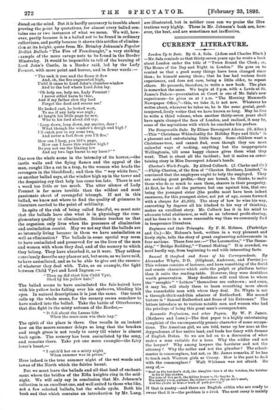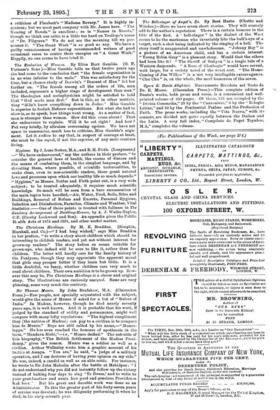Romantic Professions, and other Papers. By W. P. James. (Mathews
and Lane.)—The first paper is a highly entertaining complaint of the unconquerably prosaic character of some occupa- tions. The American girl, we are told, turns up her nose at the drygoodsman of her native land, and feeds her fancy with dreams of English Dukes. So we are led on to a discussion of what makes a man suitable for a hero. Why the soldier and not the lawyer ? Why among lawyers the barrister and not the attorney ? Why the miller alai not the plumber ? The Echool- master is commonplace, but not, as Mr. James remarks, if he has to teach such Western girls as Cressy. How is the poet to deal with the commonplace ? Walt Whitman was not afraid. Ile sang of,— " Beef on the lantrher's Etill, ths slanghte--howe of the hatcher, the hatcher
in his ki ling-cluthes. The pens of live pork. the killin7 fia?. ho-bo k,
The sealdEr stab, guttinv, the cutler', c eave-, the pa heed maul, And the plente ns wintt r work of pork-pac'tin."
If that is poetry—and there are English critics who are ready to swear that it is—the problem is salved. The next essay is mainly
a criticism of Flaubert's "Madams Bovary." It is highly in- genious; but we must part company with Mr. James here. "The Naming of Novels" is excellent ; so is "Names in Novels," though we think our critic is a little too hard on Trollope's name of 'Dr. Filgrave." We do not see the meaning till we pro- nounce it. "The Great Work" is as good as any. We have a guilty consciousness of having recommended writers of good occasional verse to centre their energies on "A Great Work." Happily, no one seems to have tried it.



































 Previous page
Previous page